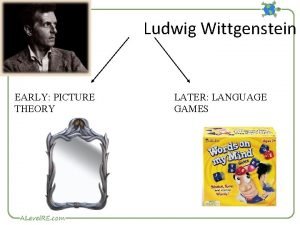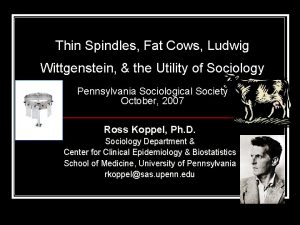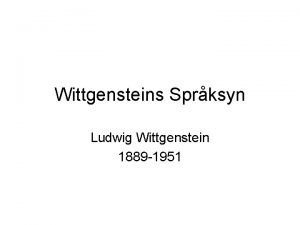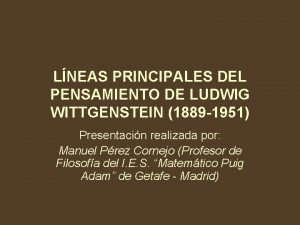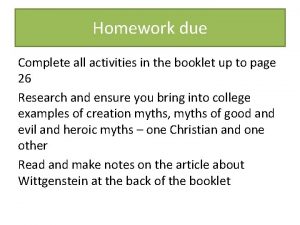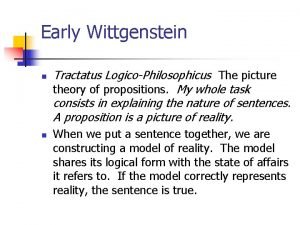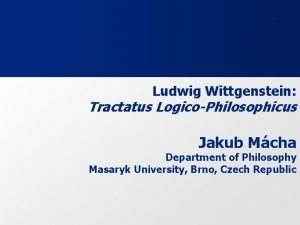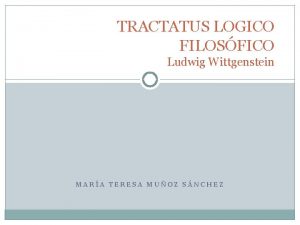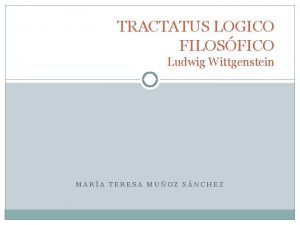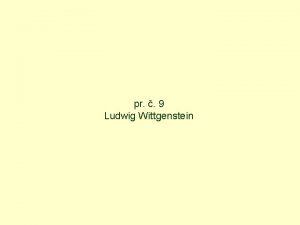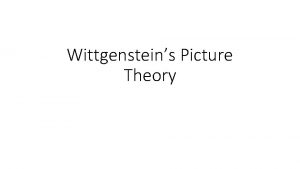Early Wittgenstein n n Tractatus LogicoPhilosophicus The picture













- Slides: 13

Early Wittgenstein n n Tractatus Logico-Philosophicus The picture theory of propositions. My whole task consists in explaining the nature of sentences. A proposition is a picture of reality. When we put a sentence together, we are constructing a model of reality. The model shares its logical form with the state of affairs it refers to. If the model correctly represents reality, the sentence is true.

The nature of thought. n A thought is a sentence with a sense. Thinking n is not possible without language. n n Thinking is a kind of language. For a thought too is. . . a logical picture of a sentence, and therefore it is just a sentence. . A thought describes a possible state of affairs. n n Philosophy indicates what cannot be said (or thought) by finding what can be said. Names stand for objects. A sentence combines names into a certain configuration (The cat is on the mat. ) Outside of logic, everything is accidental.

Later Wittgenstein n Rejection of linguistic essences. The meaning of a word is its use in a language. n There is no universal property shared by all ‘games’, there is, rather, a complicated network of similarities overlapping and crisscrossing. . . a set of family resemblances. n To understand a sentence, then, one must be a participant in the language-game that displays the use of the sentence.

Task of Philosophy n It is of the essence of our investigation that we do not seek to learn anything new by it. We want to understand something that is already in plain view. . Our investigation is therefore a grammatical one. Such an investigation sheds light on our problem by clearing misunderstandings away. Misunderstandings concerning the use of words. . n n n Philosophy may in no way interfere with the actual use of language; it can in the end only describe it. What is your aim in philosophy? To show the fly the way out of the fly bottle. Impossibility of a private language.

Wittgensteinian Aphorisms n n n A nothing would serve just as well as a something about which nothing could be said. (PI, 304) Always get rid of the idea of the private object in this way; assume that it constantly changes, but that you do notice the change because your memory constantly deceives you. (PI, Pt II ix) It is humiliating to have to appear like an empty tube, which is simply inflated by a mind. (Culture and Value, p. 11)

Existentialism n n n Kierkegaard’s attack on Christendom. Authentic vs inauthentic faith. Lessing’s ugly ditch: The impossibility of basing one’s eternal happiness on a more or less probable historical claim. The necessity and desirability of a passionate, irrational, leap of faith.

Soren Kierkegaard (1813 -1855) AKA: Johannes Climacus; Johannes Anticlimacus. n Once it was at the risk of his life that a man dared to profess himself a Christian; now it is to make oneself suspect to venture to doubt that one is a Christian. n n Religion can make selfcenteredness seem respectable. Authentic Christianity isn’t based on doctrinal or historical certainties, it is passionate subjectivity. If I am capable of grasping God objectively, I do not believe, but. . . because I cannot do this I must believe.

Kierkegaard’s Thought n n n Approximation argument: Objective historical reasoning can never be more than approximately true, hence it can never provide a basis for an eternal happiness. Postponement argument: Since all the evidence will never be in, an objective inquirer must always postpone faith. Passion argument: Objectivity is inversely proportional to passion.

Friedrich Nietzsche (1844 -1900) n n God is dead. Traditional religious and metaphysical systems have been undermined by the scientific method. Without some new basis for morality and meaning, nihilism will prevail. n n A new naturalism (which affirms life) is necessary to replace the old myths. I entreat you my brothers, remain true to the earth, and do not believe those who speak to you of superterrestial hopes. They are despisers of life, selfpoisoned men of whom the earth is weary.

Nietzsche’s Naturalism n Master vs slave morality. The weak, in an effort to protect themselves from the strong, created slave moralities of kindness and compassion. n The master exerts his will to power and recognizes that what is good is what is good for him. He affirms his life instinct and exists beyond good and evil.

Aphorisms n n n What is good? - All that heightens the feeling of power, the will to power, power itself in man. To live alone must be an animal or a god- says Aristotle. There is yet a third case: one must be both- a philosopher. Madness is something rare in individualsbut in groups, parties, peoples, ages it is the rule. We have no organ at all for knowledge, for truth: we know, or believe or imagine, precisely as much as may be useful in the interest of the human herd, the species: and even what is here called usefulness is in the end only a belief, something imagined and perhaps precisely that most fatal piece of stupidity by which we shall one day perish. The man of knowledge must be able not only to love his enemies but also to hate his friends. n n Everyone who has ever built anywhere a new heaven first found the power thereto in his own hell. You will never get the crowd to cry Hosanna until you ride into town on an ass. Thoughts are the shadows of our sensations- always darker, emptier, simpler than these. The philosopher believes that the value of his philosophy lies in the whole, in the building: posterity discovers it in the bricks with which he built and which are then often used again for better building: in the fact, that is to say, that building can be destroyed and nonetheless possess value as material.

Sartre’s Subjectivism n n Existence precedes essence. There is no universal human nature because there is no God to create one. Each of us must create our own essence by the actions we do, the choices we make. To fail to choose for oneself is bad-faith. The necessity of choice with nothing to guide us creates angst.

Existential Abandonment n n n The anguish of Abraham. The anguish of Sartre’s student: Join the resistance or care for mother? No moral theory can guide his choice. n n n Abstract values don’t apply to concrete cases. You are free, therefore choosethat is to say, invent. The moral choice is comparable to the construction of a work of art.
 Picture theory wittgenstein
Picture theory wittgenstein William foote whyte
William foote whyte Ludwig dmca
Ludwig dmca Ludwig wittgenstein
Ludwig wittgenstein Dz phillips
Dz phillips Master morality vs slave morality
Master morality vs slave morality Early cpr and early defibrillation can: *
Early cpr and early defibrillation can: * Picture 1 picture 2
Picture 1 picture 2 ưu thế lai là gì
ưu thế lai là gì Hệ hô hấp
Hệ hô hấp Tư thế ngồi viết
Tư thế ngồi viết Hát kết hợp bộ gõ cơ thể
Hát kết hợp bộ gõ cơ thể đặc điểm cơ thể của người tối cổ
đặc điểm cơ thể của người tối cổ Cái miệng bé xinh thế chỉ nói điều hay thôi
Cái miệng bé xinh thế chỉ nói điều hay thôi
